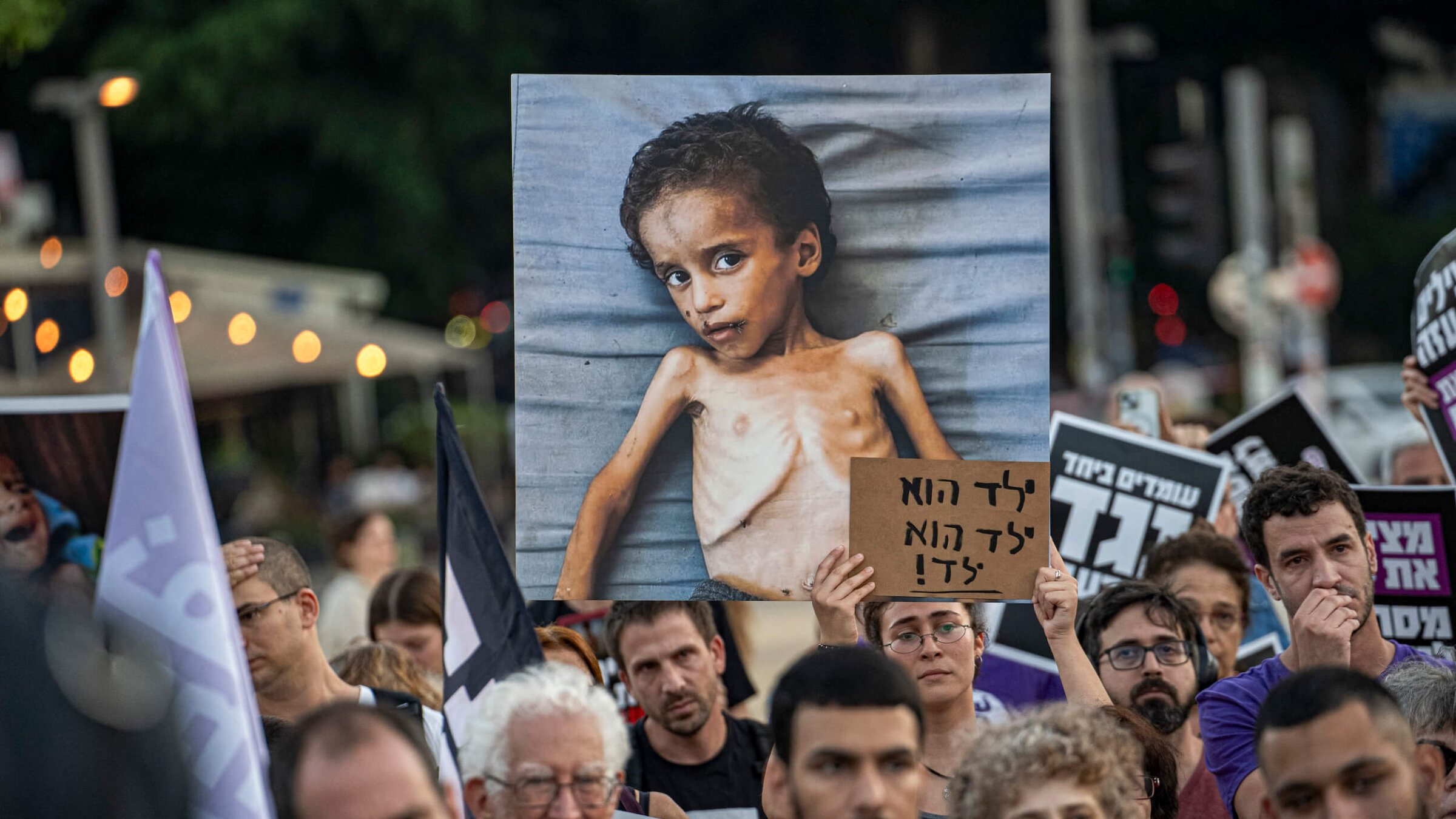Is starvation in Gaza really Israel’s fault? The facts are clear
There are those who would have us believe that Israel is blameless in this crisis. They’re not telling the whole truth.

Israelis in Tel Aviv march and protest against the Israeli government last week, accusing it of starving Palestinian civilians in the Gaza Strip. Photo by Ori Aviram/Middle East Images via AFP/Getty Images
Sen. Ted Cruz of Texas had a quippy response to a message from actor Michael Caine on X, which read, “Feed the Children of Gaza, no child should be starving.”
“I assume this is addressed to Hamas?” Cruz wrote.
Cruz is not alone in suggesting, amid increasing reports of the threat of mass starvation in Gaza, that fault lies not with Israel for refusing to let in humanitarian aid, but rather with Hamas. Some insist that Hamas is stealing aid for themselves, and that it is Hamas, not Israel, that is depriving the population. “Israel, since this war began, has supplied over 94,000 truckloads full of food. It’s enough to feed 2 million people for two years. Trying to get that into Gaza. But Hamas has stolen the food,” said Speaker of the House Mike Johnson.
Yet it is not a defense of Hamas, an extremist and exploitative organization that has held dozens of innocent people hostage for hundreds of days, to say that Israel bears responsibility for starvation in Gaza. We know this because Israeli officials have, for months — indeed, since the start of the war — not only admitted to working to restrict the aid that makes its way to Gaza, but bragged about doing so.
Yes, Israeli Prime Minister Benjamin Netanyahu is now claiming that it is a lie to say that Israel has withheld aid. But it’s a little late for that.
“I have ordered a complete siege on the Gaza Strip. There will be no electricity, no food, no fuel, everything is closed,” said then-Israeli Defense Minister Yoav Gallant on Oct. 9, 2023, two days after the Hamas attack on Israel that launched the war. “We are fighting human animals and we are acting accordingly.”
This was not a secret. It was the proclaimed policy. And it has been followed as such, on and off, ever since.
Back in March, Israel blocked all aid — including food — from entering Gaza, a position that Israel Katz, the defense minister who replaced Gallant, insisted would remain in place in April. Blocking aid, Katz said, was “one of the main pressure levers” on Hamas.
When the government adjusted, the following month, to allow some aid into the embattled strip, some in the Israeli government took comfort in how negligible it was. Finance Minister Bezalel Smotrich backed off a threat to quit the coalition in response to the change, reassured that the “minimum necessary” of food and medicine would be allowed in — just enough “that the world does not stop us and accuse us of war crimes.”
Just last week, amid charges of rising starvation, Israel’s heritage minister, Amichai Eliyahu, gave an interview in which he said, “there is no nation that feeds its enemies”; that the British did not feed the Nazis; and that the Israeli government was “rushing toward Gaza being wiped out.” This, per an Israeli government minister, was Israeli policy as recently as last Thursday.
Yet resistance to the idea that Israel must shoulder much, if not all, of the blame for starvation in Gaza continues.
Some members of Congress, on both sides of the political aisle, have taken the line that aid would be allowed in if there were a ceasefire, and that Hamas is the party responsible for the lack of one. Rep. Dan Goldman, a Democrat from New York, posted, “Gaza is on the brink of mass starvation. Israel, the U.S. and the international community must collaborate to ensure a massive surge of humanitarian relief immediately,” to which he added: “This war must end. And let’s be clear: Hamas could end it today if they wanted to.”
And outside of Congress, arguments about responsibility are proliferating. “Even the U.N. admits aid is stolen, including ‘forcefully by armed actors,’” wrote the American Israel Public Affairs Committee, in response to a New York Times story on Israeli officials who said there was no proof that Hamas was routinely stealing U.N. aid. “But don’t let the facts get in the way of an anti-Israel story.”
Those who haven’t been closely following news of the war — a group that should not include sitting members of Congress — might be forgiven for being confused. A report by the Bureau of Humanitarian Assistance of USAID found no evidence of massive theft by Hamas, but conceded that, since those receiving aid aren’t vetted, it is indeed possible that some supplies went to Hamas officials. One can see how, if one wanted to, it would be possible to take that to mean that Hamas is stealing otherwise well-distributed food.
And Israel’s claim that aid has amassed on the Gaza side of the border, and that Hamas and aid groups within the strip have failed to distribute it, may seem at first glance to be similarly convincing. But, as is regularly the case in this war, the true story is more complicated. David Satterfield, the United States’ former humanitarian envoy to Gaza, has said that the U.N. and international organizations are not withholding aid; instead, they are severely hampered in distributing it because aid transport routes have become too dangerous or badly damaged due to the devastation wrought by the war.
That’s part of what’s elided by arguments that Israel is not responsible for the current starvation: This isn’t a development of the last few weeks, but rather the result of almost 22 months of war in Gaza.
More than a year ago, concerns about the dearth of aid entering Gaza were so severe that former President Joe Biden’s administration built a pier — which ultimately proved ineffective — to try to channel in aid that Israel wouldn’t otherwise allow. Aid providers in Gaza have been killed by Israeli strikes multiple times, including World Central Kitchen workers struck dead while in vehicles that clearly marked them as humanitarian workers.
To pretend, at this late date, that Israel has not thoroughly laid the groundwork for this crisis — and ignore that Israeli officials have said, over and over, that they would refuse to feed the people of Gaza — is to do two things.
First, it is to waste time in a situation where there is no time to waste. Bodies are shutting down from hunger now. The food scarcity in Gaza poses a particular threat to children, and they are dying. They do not have the luxury of waiting for policymakers and pundits to have this bad faith argument.
Second, it is to provide the rest of us, who do have time, with the luxury of an alternate reality that bears little relationship to the actual facts on the ground. We should not pretend that aid airdrops, which aid agencies have written off as an insufficient distraction and no substitute for letting aid in via trucks, are an answer to or reversal of this problem. And Israel’s newly announced policy of daily humanitarian pauses may sound good, but constitutes, per U.N. aid chief Tom Fletcher, a “drop in the ocean” compared to the intense interventions that the situation requires.
Here, too, we can listen to Israeli officials’ own words: Netanyahu himself has described the amount of aid being allowed in to offset mass starvation as “minimal.”
A realm in which all this suffering is Hamas’ fault, and Israel is simply trying its best to conduct a just war, may be a comforting one. But unfortunately, it’s not where we actually live.

















